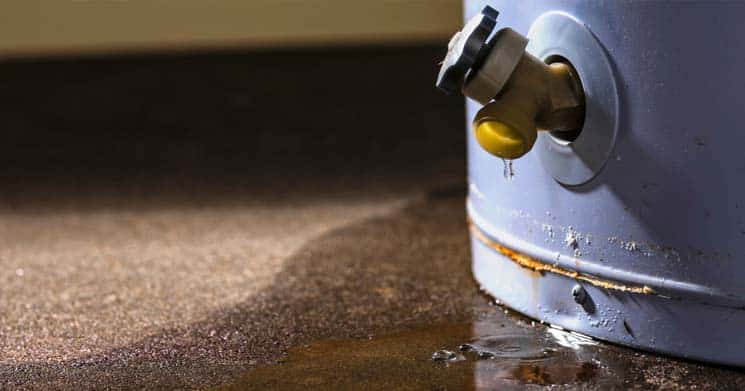
When You Need Emergency Water Heater Repair
Losing hot water can throw your whole day off—especially if you’re getting ready for work, keeping up with the kids, or hosting guests. Cold showers, puddles around the tank, or strange noises from the heater are all signs it’s time to call in a pro. We know that emergency water heater repair can’t wait, and it’s why we’re ready now.
Common warning signs include:
- Leaks – Even a small puddle may mean big things for your water heater. A leaking water heater should never be ignored.
- Temperature swings – Hot one minute, cold the next? It could be a failing heating element or thermostat.
- Strange sounds – Popping, banging, or hissing usually means sediment buildup or pressure problems.
Water heaters deal with gas, electricity, and pressurized water—trying to fix one without the right training can make the problem worse (and more expensive). An experienced plumber can find the cause quickly and get your hot water back without risking your safety.
If your water heater is leaking or not heating at all, don’t wait. We’re ready to respond with fast, expert service to get things back to normal.
Types of Water Heaters & Common Issues
Different homes use different types of water heaters. Here’s what you’ll most often see:
Conventional Tank Water Heaters
- Sediment buildup – Minerals settle at the bottom, reducing efficiency.
- Leaks – Older tanks may rust and develop leaks.
- Inconsistent temperatures – Often caused by a failing thermostat or heating element.
Tankless Water Heaters
- Ignition problems – Could be a gas supply issue or faulty component.
- Mineral buildup – Hard water can cause scaling inside the system.
- Overload – May struggle to supply multiple fixtures at once.
Signs Your Water Heater May Need Repair:
- Loud banging, popping, or hissing sounds.
- Hot water that runs out too quickly or changes temperature suddenly.
- Rusty or cloudy water.
- Leaks or damp spots around the heater.
- Gas pilot light going out repeatedly.
The Emergency Water Heater Repair Process
- Identify the problem – If you smell gas or see water, you have an emergency
- Turn off power and water – If you can do so safely, shut off electricity or gas and close the water supply.
- Call a professional – Trained plumbers can make safe, effective repairs.
- Prepare the work area – Remove any belongings near the area so repairs can start right away.
- Professional diagnosis – With our decades of experience, we can determine the type of repair you need
- Make repairs – From small fixes to full replacements, we do the job right.
- Test and verify – We make sure everything is working before we leave.
Leave Emergency Water Heater Repair to the Professionals
We have seen some scary DIY situations. On the surface, a water heater repair may seem like something anyone can do. A conversation with an employee at a big box store and a few parts — what could go wrong?
We’ve seen water heaters with corroded vents (or vents completely missing), improper fittings on gas connections, and t & p lines that could quickly flood a home. If you hire an experienced, reputable plumber who makes it look easy, it’s only because they’ve put years of hard work and education into their trade.
Water heaters can involve gas lines, electrical connections, pressurized water, and dangerous exhaust. Without the right training, even a small mistake can create major safety risks or cause lasting damage to your home.
That’s why homeowners turn to our team. Every one of our plumbers has years of real-world, hands-on experience working on water heaters of all kinds. They know how to find the problem, explain what’s going on in clear terms, and carry out the repair the right way. The focus is always on safety and lasting results—so you’re not calling us back in a few weeks with the same issue.
Emergency Water Heater Repair on All Brands
No matter which brand of water heater you have, our team is ready to help. We regularly service and repair professional-grade units from trusted names like AO Smith, Bradford White, State, and Rheem. Each brand has its own features and components, and our technicians have hands-on experience with all of them.
We keep a close eye on the latest industry developments so we’re always prepared with the right solutions—especially when unexpected issues pop up. Take the recent problem with Rheem’s gas control valves (found in some 2020–2021 models): our emergency water heater repair team has helped plenty of homeowners get replacement valves smoothly under warranty and get their hot water running again fast. By staying in the know, we’re ready to respond to your emergency water heater repair needs.
We understand what a disruption it can be to not have hot water, so our trucks our fully stocked to replace standard water heater components. If a special part has to be ordered, we can help expedite the process so that you have hot water as fast as possible.
Preventative Maintenance Tips
Regular upkeep can help you avoid surprise breakdowns and save on energy bills. Here’s how to keep your water heater in good shape:
- Schedule a yearly inspection with a professional.
- Flush the tank once a year to remove sediment.
- Watch for changes in temperature, water quality, or noises.
- Consider a whole home water filter to protect your water heater
- Check the anode rod every few years to prevent rust.
- Add insulation to improve efficiency in older models.
- Set your thermostat to 120°F for safety and savings.
Why it’s worth it: Maintenance improves efficiency, extends the life of your heater, and helps you avoid costly, last-minute repairs.
Even with regular maintenance, unexpected issues can still happen — especially if your water heater is older or has heavy mineral buildup. When you suddenly lose hot water or notice leaks around the tank, it’s best to call for emergency water heater repair rather than waiting for the problem to get worse. Quick action can prevent flooding, water damage, or total system failure. At Aaron Plumbing, Heating & Cooling, our technicians respond fast to emergency calls, arriving with the tools and replacement parts needed to restore hot water safely. Whether it’s a late-night leak or a weekend breakdown, we’re here to get your water heater working again and keep your home comfortable year-round.
How A Smart Leak Detector Can Contain Emergency Water Heater Repair Situations
When it comes to avoiding the stress of an emergency water heater repair, early detection is everything. A smart leak detector, such as the Moen Flo, can sense even the smallest leaks before they turn into major problems. Installed on your home’s main water line, this device monitors water flow and pressure in real time. If it detects unusual activity — like a slow leak near your water heater or a burst pipe — it can automatically shut off your home’s water supply to prevent flooding or send you an alert, depending on the model you choose.
This kind of protection can make the difference between a quick repair and a full-scale water cleanup. For homeowners in North Georgia, where water heaters often sit in garages, basements, or utility closets, a smart leak detector adds an extra layer of peace of mind. You’ll receive instant alerts on your phone, giving you time to call a plumber before damage spreads.
Pairing regular maintenance with a leak detection system helps minimize risk, reduce costly repairs, and keep your home safe from unexpected plumbing emergencies. It’s a small investment that can save thousands in water damage — and a lot of headaches — when a water heater problem happens unexpectedly.
Expert Emergency Water Heater Repair with Expert Water Clean Up
When a water heater breaks or bursts, it’s not just an inconvenience — it can create an unexpected mess. Even a small leak can quickly spread across floors, seep into walls, or damage belongings nearby. That’s why fast action matters. At Aaron Plumbing, Heating & Cooling, we don’t just handle the emergency water heater repair — we take care of everything that comes next.
If you call us for a leaking or failed water heater, our team will evaluate whether professional water cleanup is needed. If it’s clear that water damage has already occurred, we’ll immediately coordinate with Restopros, our trusted local restoration partner, to get help on the way — without you having to make multiple calls.
Restopros will come out quickly to assess the situation at no cost to you, working hard to contain and minimize any damage. They use professional-grade drying equipment to remove water, protect your home’s structure, and prevent mold growth. If your homeowner’s insurance is involved, they can also help you navigate the claim process and ensure everything is documented properly.
By calling Aaron Plumbing first, you’ll have one point of contact for both your emergency water heater repair and your water cleanup needs. We’ll make sure your home is safe, dry, and ready for your new water heater — without the added stress of coordinating multiple companies yourself.
Aaron Plumbing is the Plumber to Call for Emergency Water Heater Repair
When you’re staring down a cold shower or flooded basement and wondering who to call, remember this: emergency water heater repair doesn’t have to be chaotic. Our team shows up fast and gets right to work. With decades of experience, clear upfront pricing, and a dedication to getting every detail right, we ensure your system is back up and running with minimal stress. If your water heater has anything going sideways—leaks, temperature swings, noises—reach out right away. You’ll get professional help the moment you need it.
